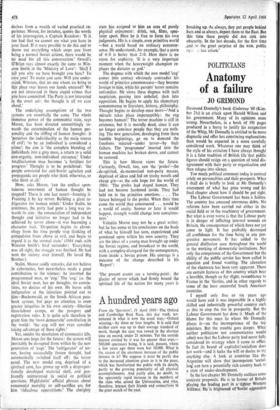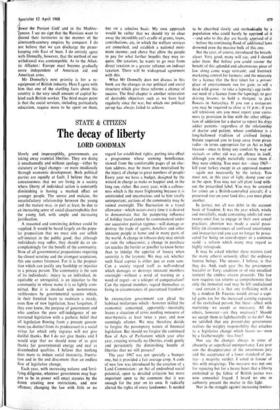Anatomy
of a fajiure
POLITICIANS
:JO GRINIOND.
Desmond Donnelly's book' Gadarene '68 Mal- ber 21s) is an attack upon Harold Wilson and his government. Many of its opinions seem wrong: Nevertheless, in a book of 191 pages produced in a hurry to justify his resignation of the Whip, Mr Donnelly is entitled to be more :dogrnatleand offer less convincing explanations than would be expected in a more carefully Considered. work. Whatever one may think of the style of his criticism I have always thought it is a false tradition Of British life -that public figures should resign on a' qtkstion of total dis- agreement with their party 'or organisation and then relapse into silence.
Too much political comment today is centred Solely on petionalities and their prospects. What I shall do is briefly to look 'at Mr Donnelly's assessment of what hai gone wrong and -his final chapter about how it should be put right.
The Labour Government has been a failure. The country has amassed 'eltOrmons debts. No reforms haVe been carried .Mit either in the social field or in the machinerfof government. But what is even worse is that die Labour party is in danger of inflicting internal wounds on Britain, the consequences of which have not yet come to light. It ha's plobably destroyed all confidence for the time being in any pro- gressive movement. It has added to the general disillusion seen -throughout the world in the working of demociatid institutions. Not only the competence of the Government but the ability of the public service has been called in -question and found wanting. The alienation of the electorate has been very apparent. There are certain features of this country which bear a horrible, though so far slight; resemblance to France in the 'thirties, and 'in other regards to some of the least successful 'South American countries.
I myself only five or six years ago would have said it was impossible in a highly skilled and industrially' powerful country- such as this to stop the rise in prosperity. But the Labour Government has done it. Much of the ' blame for this must lie where Mr Donnelly places it—on the incompetence of the top ministers. But the trouble goes deeper. What neither politicians nor commentators would admit was that the Labour paity had never fully considered its strategy when it came to office. In fact its brand of capitalist/socialism does not work—and it lacks the' ll or desire to try anything else. • A leek at countries like the Argentine will show that 'incompetent 'social- ism' can turn a potentially rich country back to a state of Under-development. In the last chapter Mr Donnelly outlines some concrete proposals: He is in 'favour of Britain playing the leading part in a' tighter Wegern Alliance:' He is frightened of `Soviet aggression "down.1he' Persian Gulf and in the Mediter- ranean. I see no sign -that the Russians want to extend their territories in-the manner of the nineteenth-century empires by conquest. I do not believe that we can discharge the peace- keeping role East of Suez. I do entirely agree with Donnelly, however, that the method of our withdrawal was contemptible. As to the Atlan- tic Alliance: Europe must become gradually • -more independent of American aid and American arms.
Mr Donnelly's next priority is for a re- equipment of British industry.,Flere I agree with him that one of the startling facts about this country is the very small amount of capital be- hind each British worker. The third major point is that the social services, including particularly education, require more to be spent on them,
-but on a selective basis. My own approach would be rather that we should try to clear away the incredible cat's cradle of grants, loans, contributions, etc, in which the welfare services are enmeshed, and establish a national mini- mum income; and above that allow the people to pay for what further benefits they may re- quire. On taxation, he -wants to go over from direct taxation to a greater reliance on indirect taxation. There will be widespread agreement with this.
What Mr Donnelly does not discuss in this book are the changes in our political and social structure which give these reforms a chance of success. The-final chapter is another reiteration of desirable objectives such as we have had regularly since the war, but which our political set-up has always failed to achieve.











































 Previous page
Previous page